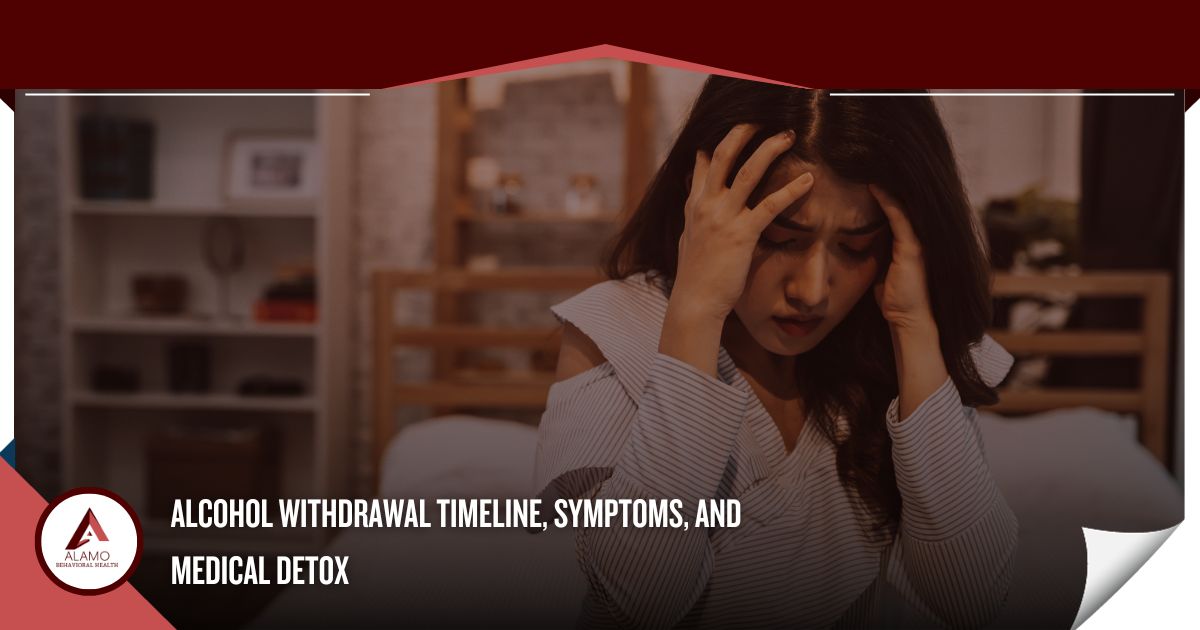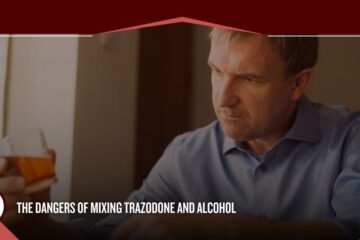 Alcoholism causes physical changes in the body that make it difficult to control your drinking and cut back on it. One of the most notable changes is physical dependence, which is characterized by the presence of withdrawal symptoms when a person stops drinking. This guide will outline what alcohol withdrawal is, the signs and symptoms, how long withdrawal lasts, and why medical detox is an essential service that can aid in a person’s recovery.
Alcoholism causes physical changes in the body that make it difficult to control your drinking and cut back on it. One of the most notable changes is physical dependence, which is characterized by the presence of withdrawal symptoms when a person stops drinking. This guide will outline what alcohol withdrawal is, the signs and symptoms, how long withdrawal lasts, and why medical detox is an essential service that can aid in a person’s recovery.

What is Alcohol Withdrawal?
Alcohol withdrawal, also known as alcohol withdrawal syndrome or AWS, refers to the symptoms that appear when someone who has alcohol dependence suddenly stops drinking or reduces the amount of alcohol they drink drastically. It typically happens in individuals who have been consuming alcohol heavily and regularly for an extended period, leading their body to adapt to its presence and require alcohol to feel “normal.”
With prolonged and heavy alcohol use, the brain adjusts its chemistry to compensate for the depressive effects of alcohol. Alcohol enhances the gamma-aminobutyric acid (GABA) neurotransmitter in the body which helps calm and regulate the central nervous system. On the other hand, glutamate, an excitatory neurotransmitter, is suppressed by alcohol. The central nervous system adapts by becoming more excitable to maintain the balance of GABA and glutamate despite alcohol in the system. However, when alcohol is removed, GABA activity drops, and glutamate becomes more active, leading to increased nervous system activity.
The imbalance in neurotransmitters and the overexcitement of the nervous system result in various withdrawal symptoms, ranging from mild to severe, depending on the level of alcohol dependence. People who have been drinking heavily for extended periods of time as well as those who have a history of previous withdrawal episodes are more susceptible to severe withdrawal.
Symptoms of Alcohol Withdrawal
Alcohol withdrawal is often self-diagnosable because the symptoms subside when one’s regular alcohol intake resumes. Factors influencing the severity of alcohol withdrawal include the duration and amount of alcohol consumed, individual health factors, any history of previous withdrawal episodes, and whether other substances are involved.
Common symptoms of alcohol withdrawal are:
- Anxiety
- Shaky hands (tremors)
- Headache
- Sweating
- Nausea
- Vomiting
- Insomnia
- Mood swings
- Increased heart rate
- Higher blood pressure
- Confusion
- Irritability
- Agitation
- Difficulty concentrating
- Seizures
- Hallucinations
- Delirium tremens (DTs)
Delirium tremens (DTs) is the most severe form of alcohol withdrawal. DTs occur in 3-5% of people but can be life-threatening without treatment. DTs should be considered a medical emergency, so individuals who suspect they are having DTs should seek immediate medical attention.
Symptoms of delirium tremens are:
- Profound confusion
- Severe agitation
- Hallucinations (visual or auditory)
- Fever
- Rapid heart rate
- Profuse sweating
- Seizures
When treatment is sought early on in the alcohol withdrawal timeline, DTs can be prevented and safely managed.
Alcohol Withdrawal Timeline and Stages
Alcohol withdrawal symptoms typically start within hours to a few days after the last drink, with symptoms peaking in intensity within the first few days. Symptoms tend to be at their worst for the first 48 hours after quitting drinking and can last anywhere between three and seven days. People who experience DTs typically begin doing so between 12-24 hours after their last drink.
An estimated alcohol withdrawal timeline is:
- 6-12 hours after the last drink – Mild withdrawal symptoms like anxiety, tremors, insomnia, and headache may appear. Stomach upset is also common.
- 12-14 hours after the last drink – Some people begin experiencing seizures and/or DTs. Others experience a gradual escalation of other symptoms.
- 24-72 hours after the last drink – Symptoms will become their most severe and individuals should be under medical supervision.
- After 72 hours – Symptoms will begin to subside, with most of them resolving within one week.
Stages of Alcohol Withdrawal
The exact alcohol withdrawal timeline can vary dramatically from one person to the next, so it is best described in stages of severity. According to the American Academy of Family Physicians, the three potential stages of alcohol withdrawal are as follows:
- Stage one – Symptoms during stage one are typically mild and may include anxiety, headache, tremors, nausea, abdominal pain, and heart palpitations.
- Stage two – The symptoms that occur during stage two are moderate and may include rapid breathing, increased blood pressure, increased heart rate, mild hyperthermia, and confusion.
- Stage three – The most severe stage of withdrawal, stage three, is characterized by visual or auditory hallucinations, seizures, confusion, poor attention span, and disorientation.
It’s important to note that alcohol withdrawal can be managed safely under medical supervision, often involving medications to ease symptoms and prevent complications. Seeking professional help when quitting alcohol is essential for managing withdrawal symptoms and ensuring a safer and more successful recovery.
Factors that Affect the Duration and Severity of Alcohol Withdrawal
The timeline and severity of alcohol withdrawal can vary greatly due to several factors that are unique to the individual, including:
- Amount and duration of alcohol consumption – The quantity of alcohol consumed over time and the duration of alcohol abuse can impact the severity of withdrawal. Long-term heavy drinkers are more likely to experience severe symptoms.
- Individual differences – Each person’s body responds differently to alcohol withdrawal. Factors such as age, overall health, genetics, and any co-occurring mental or physical health conditions can affect how severe the withdrawal symptoms are and how long they last.
- Previous withdrawal experiences – Individuals who have a history of repeated alcohol withdrawals may have more intense symptoms and a higher risk of severe withdrawal, including delirium tremens.
- Other substance use – Concurrent use of other drugs or substances alongside alcohol can complicate withdrawal symptoms and their severity.
- Medical complications – Certain medical conditions can exacerbate alcohol withdrawal symptoms or increase the risk of complications. Liver disease, heart problems, or neurological issues may make withdrawal more challenging.
- Support and medical intervention – Access to medical care, support systems, and treatment interventions can significantly impact the course and severity of withdrawal. Medical assistance, including medications and professional guidance, can help manage symptoms and reduce the risk of severe complications.
- Stress and environment – Stressful environments or situations can exacerbate withdrawal symptoms. A supportive and calm environment can help mitigate the severity of symptoms.
Medical Detox and Treatment for Alcohol Withdrawal
Detoxification is the natural process of the body eliminating toxic substances, including drugs and alcohol, from the body. Medical detox is a supervised and medically-assisted approach to detoxification and is often viewed as the first step of treatment. Alcohol detox may occur on an inpatient or outpatient basis, depending on the individual’s needs.
Assessment
Before detox begins, medical professionals evaluate the individual’s overall health, the severity of alcohol use, any coexisting conditions, and previous withdrawal experiences to determine the most suitable treatment approach.
Medical supervision
Medical detox typically occurs in an inpatient or outpatient setting under the supervision of healthcare professionals. This ensures continuous monitoring of vital signs and symptoms, allowing for immediate intervention if severe symptoms arise.
Medications
Certain medications may be prescribed to alleviate withdrawal symptoms and prevent complications. For example, benzodiazepines such as diazepam or lorazepam are commonly used to manage anxiety, seizures, and insomnia during alcohol withdrawal. Individuals may be slowly tapered off these medications as their body adjusts to not having alcohol.
Fluids and nutrition
Maintaining proper hydration and nutrition is crucial during alcohol detox. Intravenous fluids may be administered to prevent dehydration, and nutritional support can help replenish vitamins and minerals depleted by alcohol abuse.
Psychosocial support
Counseling, therapy, and support groups play a vital role in addressing the psychological aspects of alcohol dependence. Behavioral therapies can help individuals understand their triggers, develop coping strategies, and prevent relapse.
Aftercare planning
Once detox is completed, a comprehensive aftercare plan is crucial to support long-term recovery. This may involve ongoing therapy, participation in support groups (such as Alcoholics Anonymous), and access to resources that help maintain sobriety.
Addressing underlying issues with alcohol rehab
Effective treatment for alcohol dependence often involves addressing underlying psychological or social issues contributing to alcohol abuse. This might involve therapy for co-occurring mental health conditions or addressing social factors influencing alcohol use. These services that are offered beyond detox help prevent relapse and future alcohol withdrawal episodes.
Find Help Today
Alamo Behavioral Health aims to ensure a safe and comfortable detoxification experience with constant medical supervision and appropriate interventions. Our detox program involves the use of medical interventions, under the guidance of healthcare professionals, to safely manage withdrawal symptoms and minimize the risks associated with the detoxification process. If you or a loved one are struggling with alcoholism and are ready to discuss your treatment options, please contact us today.



